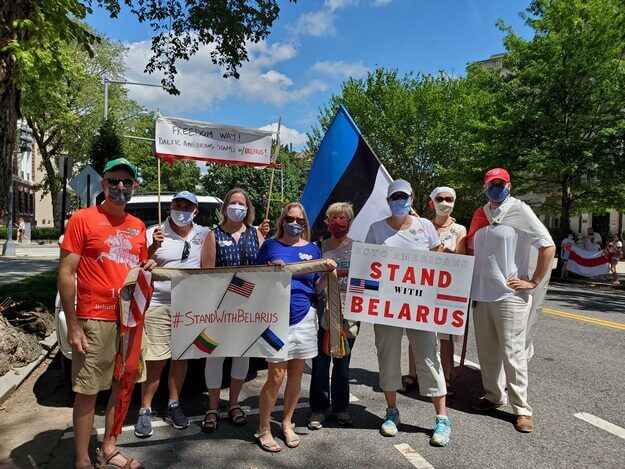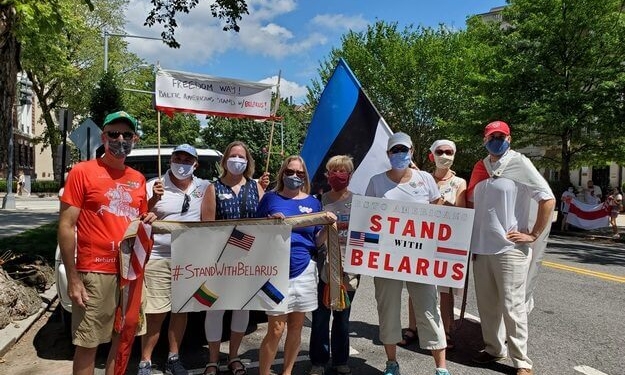Belarus, its current political situation, and the United States’ response were among the topics discussed at the Central and East European Coalition’s (CEEC) panel discussion on February 24th, titled “Belarus’s Transition from Dictatorship to Democracy”. The event was organized in coordination with the office of Representative Marcy Kaptur (D-OH), who also made remarks.
Speakers noted the continued instability of the political situation in Belarus since the fraudulent elections that took place in August 2020. President Alexander Lukashenka remained in power despite clear evidence that the election results were falsified. Protests continue by Belarusian citizens who are determined to bring change and the regime has run out of options to quell the demonstrations; only brute violence is left. The most important goal of the demonstrators is to force a new, transparent, free and fair presidential election to determine rightful leadership of the country. Meanwhile, opposition leader, and Lukashenka’s opponent in the August elections, Sviatlana Tsikhanouskaya has been living in exile in Lithuania until it is safe for her to return to Belarus. It is good that the West didn’t recognize the August 2020 elections, but nations are also not ready to recognize Tsikhanouskaya as the elected leader, making new elections a necessity for democracy to take hold.
The United States has imposed sanctions on the government in response to election irregularities and violent crackdowns against citizens. The panel called for action beyond sanctions, to include more effective involvement by the Organization for Security and Cooperation in Europe (OSCE). The OSCE’s Moscow Mechanism was invoked in September 2020 to conduct an independent investigation of human rights violations in Belarus, but has so far not been fully employed. Concern was expressed over Russian President Putin’s support of Lukashenka and capitalizing on the Belarusian leader’s weakness while strengthening the Kremlin’s control over Belarus’s government and economy.
Panelists stated the importance of consistent support by Western nations. If Western support waivers, Putin will manipulate the cracks. They deemed the U.S. to be in the best position to unite the West in solidarity with the freedom fighters in Belarus and ensure the momentum toward democracy remains strong. Some practical ways this can be done include increasing levels of assistance to political prisoners and to facilitate the democratic transition, and debunking disinformation campaigns that paint the opposition as an exercise of influence by the U.S. or the West. Members of the Belarusian diaspora and other concerned parties can help by ensuring their communities are informed, advocating in Congress to keep attention on the issue, and engaging in political action to encourage more resolute policies. Congresswoman Kaptur expressed her deep concern regarding the oppression that peaceful protesters are facing bravely. She also acknowledged the important role that women are playing in Belarus’s quest for democracy. She stated strong Congressional support for the people of Belarus to choose their own future and noted the leadership of the House of Representatives in the drive for freedom and democracy everywhere. House Resolution 124, cosponsored by herself and Representative William Keating (D-MA), was introduced the day after the policy event. The resolution aims to support the people of Belarus and their democratic aspirations and to condemn election rigging and violent crackdowns in Belarus.

Washington, DC Estonian community members supporting the Freedom Way rally for Belarus on August 23, 2020. Photo by Karin Shuey. 
Panelists from the event as Representative Kaptur gives her remarks.
The panelists were Valery Kavaleuski, Sviatlana Tsikhanouskaya’s Representative on International Affairs; Jonathan Katz, Senior Fellow and Director, Democracy Initiatives, The German Marshall Fund of the United States; and Vytis Jurkonis, Project Director, Freedom House – Vilnius. The discussion was moderated by Michael Sawkiw, Director, Ukrainian National Information Service and CEEC member.
The full video of the event and biographies of the speakers are available on the CEEC website at ceecadvocacy.org. The Estonian American National Council (EANC) fully supports the efforts of the freedom fighters in Belarus and U.S. government policies to facilitate their success. EANC invites readers to bring the issue to the attention of Congress and to ask their Representatives to support H.Res.124.
Karin Shuey
Washington, DC Director
Estonian American National Council
www.estosite.org















